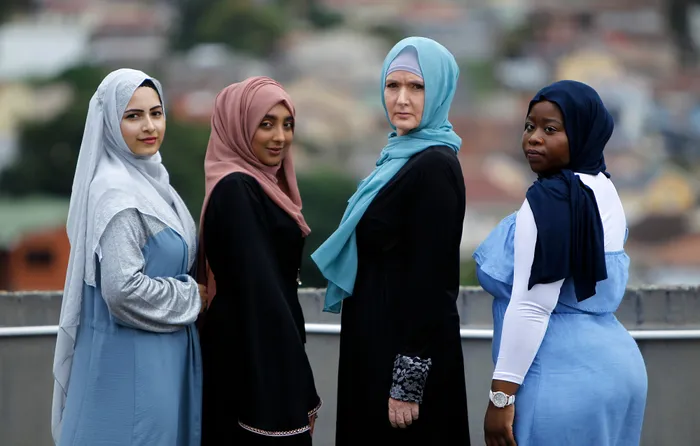’Leave out hijab alone,’ says some Hindu women in SA in support of Muslim students in India

Muslim women from the Caring Sisters Network in Durban say they firmly support Muslim students in India who are fighting for the right to wear the hijab in class. Two of the women pictured are reverts who accepted Islam as their religion several years ago. From left to right Ayushi Devraj, Azra Hoosen, Cindy Marshall and Ayesha Sadeck.
Durban: South African women have come out in support of Muslim women in India who are at the centre of a hijab row that has divided that nation and made international headlines.
The countrywide protests, which started in the southwestern state of Karnataka, hinge on whether students at an academic institution have the right to wear the traditional Muslim headscarf, even though it is not part of their uniform.
The matter is currently being heard in the Karnataka High Court.
On Tuesday the court made reference to a South African case dating back to the early 2000s in which a Hindu mother challenged Durban Girls’ High in the Equality Court because it refused permission for her daughter to wear a nose ring.
At the time the school argued that it went against its code of conduct, but Navi Pillay said that Sunali was only following her family’s time-honoured culture.
The outcry in Karnataka, a majority Hindu state, started in December and the situation apparently became volatile when the female students were heckled by men dressed in saffron shawls (the colour of the ruling Hindu rightwing Bharatiya Janata Party) who were shouting Hindu slogans.
While Hindu women in South Africa have noted that there are various versions of the matter in circulation and that institutions have dress codes that should be obeyed, they say freedom of religion or religious practices are sacrosanct.
Ela Gandhi, the granddaughter of Mahatma Gandhi and member of the Gandhi Development Trust, said Hinduism taught the unity of humankind, peace and tolerance.
"If Hindu men were forcing Muslim women to remove their scarves, it is unacceptable and a misrepresentation of the religion. Once you accept intolerance of any kind it can escalate into any other kind of intolerance,” said Gandhi.
Freedom of choice was important, she said, and it should be up to individuals what they wanted to wear in terms of religion or custom.
Arthi Nanackchand Shanand, the President of Arya Samaj South Africa, said if the institution in Karnataka specified a particular dress code then students had to comply.
However, she believed that Hindu men had no right to prevent Muslim women from wearing the hijab to class.
“It does not concern them. It's a matter between the school management and the students. As a Hindu priest (of the Vedic Purohit Mandal), I can safely say that our scriptures do not support patriarchy, on the contrary, they support dignity and respect for all women."
Shameen Thakur-Rajbansi, the leader of the Minority Front, said communication played a major role in fostering understanding between communities and has called for caution so that the issue did not create conflict locally.
She said since the students wanted to wear hijab and the academic institution wanted its dress code to be followed, the matter should be dealt with by the judiciary.
“We don't know who is influencing either side in the matter.”
Thakur-Rajbansi said many countries had rules on religious dress code and citizens who wanted uniformity and equality in certain institutions didn't have any problems with that.
Ashwin Trikamjee, the head of the South African Hindu Maha Sabha, said: "All cultures, including cultural practices and beliefs, must be respected by all."
Professor Karen Milner, the national chairperson of the South African Jewish Board of Deputies, told POST they did not have a specific position in relation to India but “strongly support religious freedom and see head covering as a religious choice which should not be forcibly required nor removed”.
Meanwhile, Pastor Vusi Dube of the eThekwini Community Church, said the religious tension in Karnataka was disappointing because India was viewed as a progressive nation which many South Africans looked to for guidance.
“Religion is more important than politics because often we turn to religious leaders to resolve political issues. It is sad that in India they have reached a point where they can’t stomach their differences and people are being persecuted.”
Dube said it was also unforgiveable that the Muslim women were being targeted by men who wanted to prescribe what they should or should not wear.
“It’s unacceptable. Men should not be allowed to dominate women,” he said.
The Post